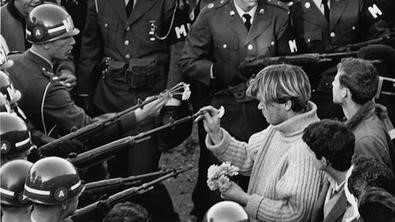August 4, 2025
Recently, I penned an opinion piece in the Tulsa World on the ways in which America is throwing away one of its most cost-effective methods of persuasion on the world stage: soft power.
The Tulsa World version (limited to 600 words) is here.
This came from a discussion I had with my friend James Chavez over coffee awhile back. Back in 2022 I told Ginnie Netherton Graham at the World that I’m probably good for one piece a year, and I was overdue.
Here’s the slightly longer original version, without the paywall:
Go anywhere in the world—even the most remote village—you’ll find traces of American culture: a T-shirt, pop songs, American movies.
In 1999, we were wandering through Tuscany and saw a girl wearing a shirt that said ‘Chicago Bulls’ on the back and showed Bart Simpson on the front, holding a football with the words ‘Touchdown, Man!’
Sometimes things get lost in translation, but I digress.
The evidence that US culture is now the world culture is an example of Soft Power.
The last 6 months of the new administration have been an assault on Soft Power: things we’ve done to influence others — persuade them to adopt our values or at least come to like us.
- Thinking about aligning with the other guys? Partner with us instead — we’ll support your democracy with foreign aid.
- The other guys control the narrative? We’ll beam in accurate reporting through a network of radio stations (Radio Free Europe).
- Facing an epidemic or health crisis? We’ll send medicines — and even more impressive, we’ll send our most altruistic young people to educate and assist (200,000 Peace Corps volunteers at last count).
- Over time, your best and brightest will want to study in America, get to know our people, and take that experience back home — often to leadership roles. (Case in point: Xi Jinping’s stay in Muscatine, Iowa, in 1985.)
All those things take money. Ever since the end of World War II, we’ve built the largest economy in the world. While doing that, we also built sufficient weapons to scare our adversaries into building more weapons — and we also had enough money left over to play the role of a benevolent mob boss—generous with allies, always ensuring our friends had reason to stay close.
The Golden Age of this approach was the 1950s through the early 1980s, when policy changes started redirecting the money. From the standpoint of the Cold War and our voluminous spending on the military, experts could see that our adversaries were running out of money, which led to the dominoes falling in Berlin and the rest of the Eastern Bloc between 1989 – 1991.
My Economics professor (and yours, too) called this the “Guns or Butter” argument. Countries must choose between these, as any increase in one leads to a decrease in the other.
But there’s a third way: being a good Mob Boss is MUCH cheaper than building a large army and strong-arming folks into doing our will. It’s sending some of your Butter overseas. You’ll remember that it wasn’t just for humanitarian reasons that we implemented the Marshall Plan in Germany and sought to rebuild Japan. Our wise leaders remembered that it was economic disaster that brought on the rise of Hitler, and nothing will make people riot and embrace an autocrat faster than having to take a wheelbarrow full of money to buy a loaf of bread. There: I’m back to Econ 101 again, but this time, Hyperinflation.
So, you could say that for the first 30-ish years after World War II, we embraced a policy of projecting democracy — not just with force, but with values. Sure, we sometimes chose Guns (Korea, Vietnam, Iraq), but look at the dollars spent: Butter — foreign aid, cultural outreach, education — is far more cost-effective. We lived it and demonstrated it, in groups like the Peace Corps, which amended the St. Francis’ quote: “Preach the Gospel (of Democracy) at all times, and if necessary, use words.”
For extra credit: go watch the Tom Hanks/John Candy movie “Volunteers.” Not a great film, but it lampoons the way the US meddled, both good and bad. With Guns and Butter.
But I digress.
On a domestic flight in China, I saw proof that other countries have studied soft power. In an in-flight magazine, I read about a Syrian student who became a commercial pilot in China. Today, we’re rapidly pulling back from the very investments that built global goodwill and stability. In some cases, we’ve cut funding so abruptly that our allies have no time to adjust. As our soft power disappears, it’s replaced by saber-rattling—whether literal (troops) or economic (tariffs).
Other nations are already routing around American unpredictability and building coalitions elsewhere. If we continue down this path, the once-generous global Mob Boss may find himself a loud but sidelined figure—out of influence and out of favor.
